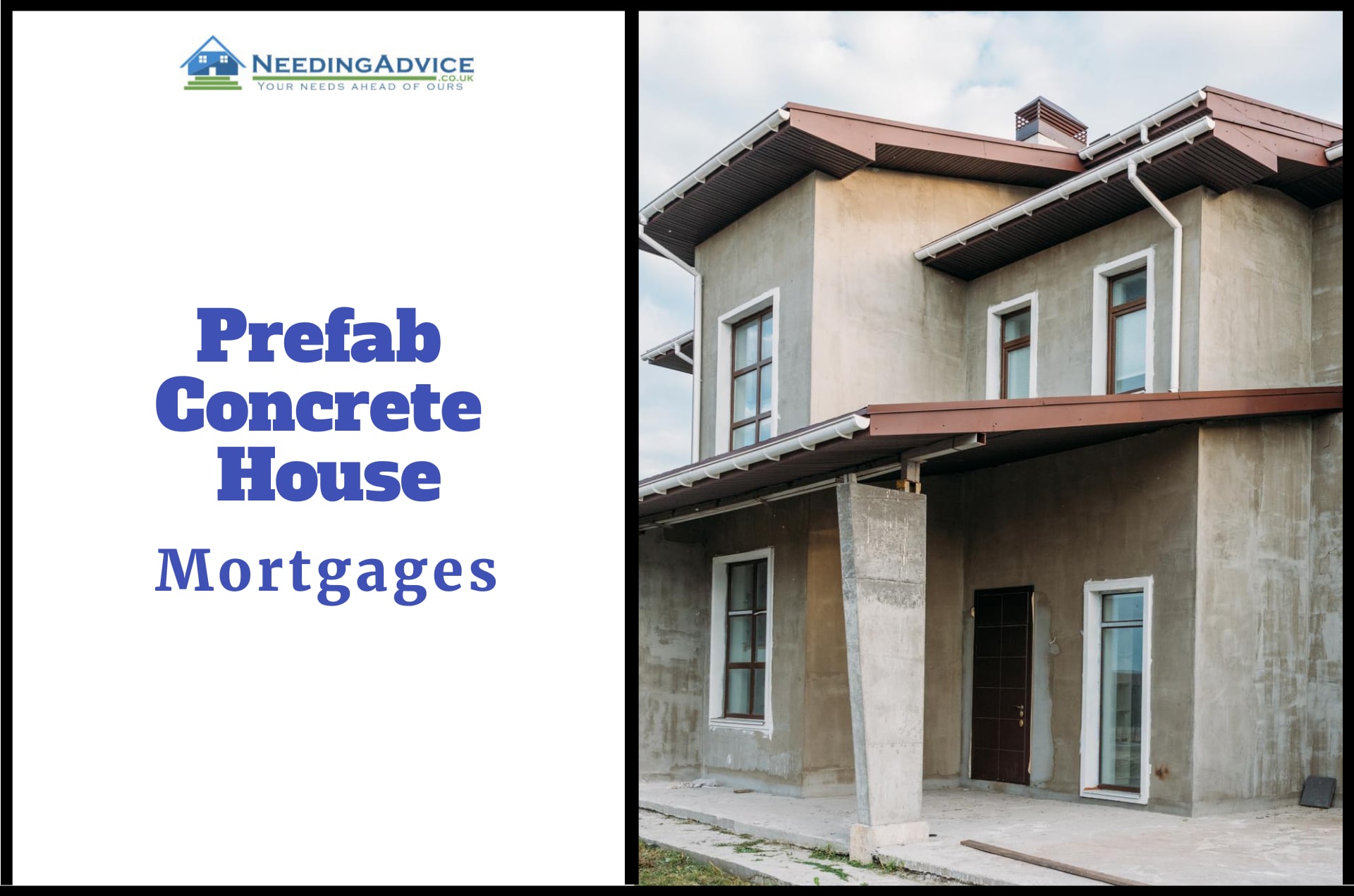Use our quiz on mortgage for prefab concrete house

I’m Damian Youell an experience mortgage broker with over a decade of experience. I’m dedicated to helping clients by offering an efficient and friendly service.
Over the years we have streamlined our systems and procedures and adapted processes to enable us to make the whole process very straight forward and easy for our clients.
We pride ourselves on being very approachable feel free to contact me:
Mortgage for Prefab Concrete House
You may have found your dream home or looking to invest in a buy to let, but the property you have found is made of concrete. Properties with non-traditional construction can be more difficult to get a mortgage for and may cause complications when trying to ensure the property or may when a home survey is carried out.
In this article, we discuss this topic in further detail and how you can get a mortgage for a prefabricated concrete house.
Post Topics
What is a prefabricated concrete house?
Why is it difficult to get a mortgage on a concrete house?
What is a prefabricated concrete house?
Non-traditional construction is homes with walls made from any other material that is not brick or stone or has a roof that is not made from tile or slate.
Prefabricated homes were used in the UK to address the housing shortage crisis after the second world war. They are cheaper and faster to build than traditional construction but were only intended to last 10 years. Considering that prefabricated concrete houses still exist and have lasted more than 10 years, it shows that they can be durable but there are still some concerns with their construction which can make it more difficult to a mortgage.
Why is it difficult to get a mortgage on a concrete house?
Mortgage Lenders are cautious about lending on a type of property made of concrete construction because of their longevity.
Walls made from concrete structures can crumble over time and if the steel binding rods which hold the concrete together begin to corrode, it can lead to cracks forming and degrade the structure. Generally, concrete houses should last minimum 50 years, and some have lasted more than 100 years but there has been instances where they have only last 20 to 30 years and this makes lenders wary.
It is difficult to judge how quickly it will deteriorate and improper maintenance can cause the property to lose value.
Lenders need to be sure that they have a good security for their loan because in the instance the borrower defaultsMissed payments on credit accounts, which can affect a borro... on payments, they will need to be able to resell the property and recoup their losses. Concrete construction homes can pose more difficulties when it comes to selling.
It can also be expensive to insure if the underwriters are unsure with the actual risks of a property with non-traditional construction and some insurers may decline to insure on this type of property altogether because of the non-standard construction nature of its structure, it can be very costly for insurers to pay out.
How to get a mortgage for a concrete house
As a prospective buyer with interest in a concrete home, it is a good idea to get a RICS home buyers survey and a building survey done on such types of property before committing to buy. This will help identify if and how much work is required on the property before you commit to a huge financial responsibility of purchasing the property and it can help you demonstrate to the lender that there are no visible damage or structural issues to the property. If a concrete house has had refurbishments carried out to ensure problems don’t arise from its concrete structure, lenders will be more willing to lend against it. If you can provide a PRC (Pre-cast Reinforced Concrete) Competition Certificate, this will show confirmation to a lender that a structural engineer has attended the property and confirmed that the structural work required to make the building secure has been carried out.
It is a good practice to try and find out all you can about the property so you can make a judgement before approaching a lender. Not all lenders will provide borrowing for concrete houses and lenders who are willing to lend will have strict guidelines on what they expect from the property before agreeing to lend.
Concrete homes can be appealing as they are generally cheaper than other similar properties in the same area that are built from traditional construction such as brick. You may be required to provide a bigger deposit on your mortgage for a concrete property than a traditional home to offset some of the lender’s risks. In some cases, lenders may choose to set a higher interest rate for lending on concrete homes.
Next steps
If you are interested in buying a concrete house but require a mortgage loan, then the help of a mortgage broker could be useful by looking at lenders both on and off the high street, including specialist lenders, to find you a lender who is more likely to provide mortgage loans for concrete houses.
FAQs
What type of construction is a concrete house?
Concrete houses are mainly classified into non-standard construction.
Why can’t you get a mortgage on a concrete house?
There are many reasons why people cannot obtain mortgages on concrete houses. The main reason being that most mortgage providers do not want to take any risk on non-standard construction properties because they are considered risky investments. They would rather invest money into bricks and mortar, which is proven to produce better returns over time. Another factor is that concrete construction house tend to cost more to build than standard housing. Therefore, the bank does not see them as an investment opportunity.
Can you get a mortgage on a concrete house?
Yes, you can get a mortgage on a concrete house, but a mortgage lender may ask to set different criteria in accessing your mortgage application. While getting a mortgage on a concrete construction house, you can contact a market broker who can help you with suitable mortgage deals for non-standard construction houses.
Is it possible to get a mortgage on a non-standard construction property?
Yes, it is possible to get a loan on a non-standard property type, but you may need to contact a market broker to get the best mortgage terms.
Why are concrete houses Bad?
The main problem with concrete houses is that they are very expensive to construct compared to normal buildings. Concrete construction properties are also considered unusual property construction constructed from steel frames, glass walls, and concrete. It also takes longer to complete because of the number of materials used. Also, concrete structures are prone to cracking when exposed to extreme weather conditions.
What are the Lending Criteria for a Concrete Build Mortgage Application?
Lenders usually look at three things when assessing whether or not to give you a mortgage:
1) Your income – how much money do you earn each month? You won’t qualify for a mortgage if you don’t earn enough money to cover the repayments.
2) How long has it been since you last moved? This helps determine if you’re going to move again soon. A new job means you have less chance of moving again within a 12-month period.
3) What kind of property will you buy? Some lenders prefer to lend on certain types of property, so tell them what you plan to use the money for before applying. For example, if you’re planning to renovate your current home, you’ll probably need to show that you’ve got savings available to pay for this work.
How Much Can I Borrow On My Concrete Home Loan?
You can borrow up to 80% of the value of your home. You could be able to borrow between 5%-10% interest rate depending on your credit score. However, there’s no guarantee that you’ll receive approval. If you decide to apply for a mortgage, we recommend contacting a specialist mortgage advisor first. These advisors specialise in helping customers like yourself find the best deals on loans.
Are concrete houses harder to sell?
No, concrete homes aren’t hard to sell. In fact, some buyers even choose to purchase these kinds of homes instead of brick-built houses. Several factors affect the sale price of a concrete home, including location, size, condition, age, etc. So, if you think you might be interested in buying one, then you should definitely speak to a real estate agent about selling yours.
Do Concrete Homes Have Any Advantages Over brick-built houses?
Yes, concrete homes offer many advantages over traditional bricks built properties. They are more energy-efficient than their wooden counterparts due to being made out of cement rather than wood. Cement is an excellent insulator meaning that heat loss through windows is reduced. The building material itself doesn’t require any maintenance, unlike timber which needs regular painting and staining. Another advantage of concrete homes is that they tend to cost less to build than other forms of housing such as brick-built houses.
Can I Refinance my Concrete Home?
Yes, you can refinance your existing house into another type of loan. Most people who want to take out a second mortgage would normally go for either a fixed-term or variable rate mortgage. Fixed rates mean that the monthly payments remain constant throughout the life of the loan, whereas variable rates fluctuate based on changes in market interest rates. Both options come with pros and cons, but ultimately, it comes down to personal preference. It is always better to contact a mortgage broker for financial advice and discuss the mortgage terms.
What other types of non-standard construction houses are there?
There are several different types of non-standard construction houses. One of the most common is prefabricated non-standard construction houses. These are usually manufactured offsite and transported to the site where they’re assembled. There are also modular homes, which are similar to prefabs except that they’re constructed from modules that are shipped to the site. There are also factory-built homes, which are built by a builder at his own premises.
Can I get a Halifax mortgage on concrete house?
If you have a concrete home, you can still qualify for a Halifax mortgage. As long as you meet certain requirements, you can expect to receive a competitive interest rate on your loan. To learn more about Halifax mortgages, feel free to contact us today.
What is the process of getting a Halifax mortgage on concrete house?
The process of obtaining a Halifax mortgage on a concrete home is very simple. All you need to do is contact us using chatbox. We will review your application and provide you with an instant decision. Once approved, you can start making repayments straight away.
Can I get a Halifax mortgage on concrete house with a steel frame?
Yes, you can get a Halifax mortgage on concrete house with a steel frame from a mortgage provider. It is always better to contact a specialist mortgage broker before starting the loan application.







Leave A Comment